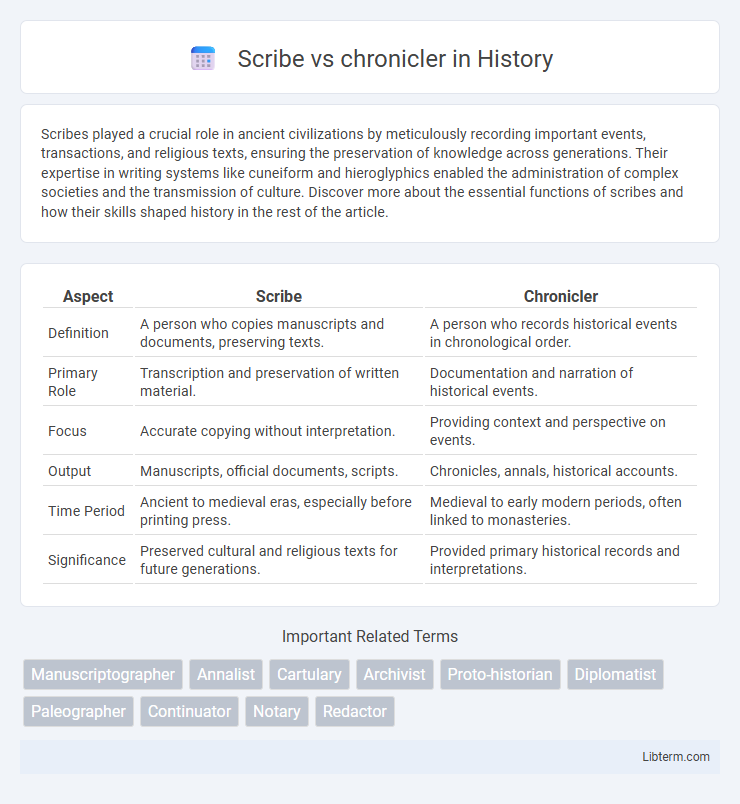Scribes played a crucial role in ancient civilizations by meticulously recording important events, transactions, and religious texts, ensuring the preservation of knowledge across generations. Their expertise in writing systems like cuneiform and hieroglyphics enabled the administration of complex societies and the transmission of culture. Discover more about the essential functions of scribes and how their skills shaped history in the rest of the article.
Table of Comparison
| Aspect | Scribe | Chronicler |
|---|---|---|
| Definition | A person who copies manuscripts and documents, preserving texts. | A person who records historical events in chronological order. |
| Primary Role | Transcription and preservation of written material. | Documentation and narration of historical events. |
| Focus | Accurate copying without interpretation. | Providing context and perspective on events. |
| Output | Manuscripts, official documents, scripts. | Chronicles, annals, historical accounts. |
| Time Period | Ancient to medieval eras, especially before printing press. | Medieval to early modern periods, often linked to monasteries. |
| Significance | Preserved cultural and religious texts for future generations. | Provided primary historical records and interpretations. |
Introduction: Defining Scribes and Chroniclers
Scribes are professionals dedicated to accurately recording spoken or written information, often focusing on legal, administrative, or historical documents. Chroniclers specialize in documenting events in a chronological order, emphasizing detailed narrative accounts of historical occurrences. Both roles are essential for preserving knowledge, but scribes prioritize transcription accuracy while chroniclers focus on contextual storytelling.
Historical Origins and Contexts
Scribes originated in ancient Mesopotamia around 3100 BCE, primarily serving as professional recorders of cuneiform script for administrative, legal, and economic purposes. Chroniclers emerged in medieval Europe between the 5th and 15th centuries, often monks or clerics who documented historical events, religious affairs, and royal lineages in narrative form. While scribes focused on accurate transcription and documentation, chroniclers synthesized information to create continuous historical accounts within specific cultural and temporal contexts.
Roles and Responsibilities Compared
Scribes primarily focus on accurate transcription and documentation of texts, often serving as record keepers or copyists in historical and legal contexts. Chroniclers hold the responsibility of compiling comprehensive, chronological narratives, emphasizing the interpretation and contextualization of events for historical records. Both roles demand meticulous attention to detail, but scribes prioritize fidelity to original documents, while chroniclers integrate broader historical analysis and storytelling.
Skills and Training Required
Scribes require proficiency in precise handwriting, literacy in multiple languages, and familiarity with legal or religious texts, often honed through formal apprenticeship or monastic schooling. Chroniclers demand advanced analytical skills, a deep understanding of historical context, and the ability to synthesize information from various sources, typically acquired through extensive scholarly training in history or archival research. Both roles depend heavily on attention to detail, but chroniclers emphasize interpretive skills beyond the transcription expertise vital for scribes.
Tools and Methods of Documentation
Scribes typically relied on traditional tools such as styluses, ink, and parchment to meticulously transcribe oral or written information, often following strict formats and scripts to ensure accuracy and preservation. Chroniclers employed a broader range of methods, including firsthand observation, interviews, and integrating multiple sources to compile comprehensive historical narratives, usually recorded in manuscripts or early printed books. Both roles emphasized detailed documentation but differed in their approach: scribes focused on faithful replication while chroniclers prioritized contextual storytelling and analysis.
Purposes and Audiences of Their Writings
Scribes primarily aimed to accurately record legal documents, religious texts, and transactional records for official or clerical use, targeting authorities, institutions, and literate elites. Chroniclers focused on narrating historical events, often with interpretive or cultural context, intended for broader audiences seeking to understand past occurrences or communal identity. The purpose of scribes was preservation and administration, whereas chroniclers sought to inform and shape collective memory.
Objectivity vs. Subjectivity in Record-Keeping
Scribes prioritize objectivity in record-keeping by meticulously documenting facts and events without personal bias, ensuring accurate and reliable historical data. Chroniclers often incorporate subjective perspectives, blending narrative elements and personal interpretations that provide context but can introduce bias. This contrast highlights how scribes offer factual precision, while chroniclers deliver more interpretive and culturally rich accounts.
Influence on Historical Understanding
Scribes played a crucial role in recording official documents and religious texts, thereby shaping the preservation of primary historical sources. Chroniclers contributed by compiling detailed, narrative accounts of events that provide context and interpretation, influencing how history is understood by later generations. The interplay between these roles enriches historical understanding through both factual recording and storytelling.
Examples of Famous Scribes and Chroniclers
Famous scribes include ancient Egyptian scribe Ani, known for the Papyrus of Ani, and medieval European monks who meticulously copied illuminated manuscripts. Notable chroniclers such as the Anglo-Saxon Chronicle author and Froissart, who detailed Hundred Years' War events, provide invaluable historical narratives. These figures significantly shaped the preservation and interpretation of history through their distinct roles in recording and documenting events.
Legacy and Modern Relevance
Scribes, historically essential for recording legal, religious, and economic information, established legacies through the preservation of ancient manuscripts and official documents that form the foundation of many modern legal and literary systems. Chroniclers contributed to legacy by providing detailed narrative histories that shaped cultural identity and collective memory, influencing how societies interpret their past. In modern relevance, scribes have evolved into data entry specialists and digital archivists, while chroniclers inspire contemporary journalistic storytelling and historical documentation that ensure continuity and context in the digital age.
Scribe Infographic

 libterm.com
libterm.com